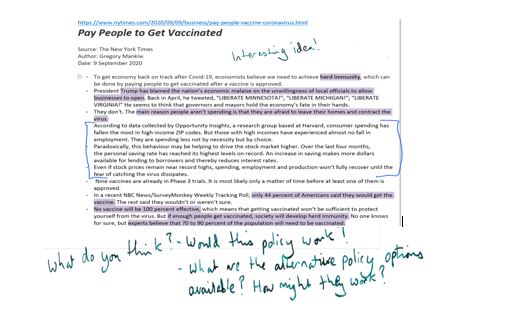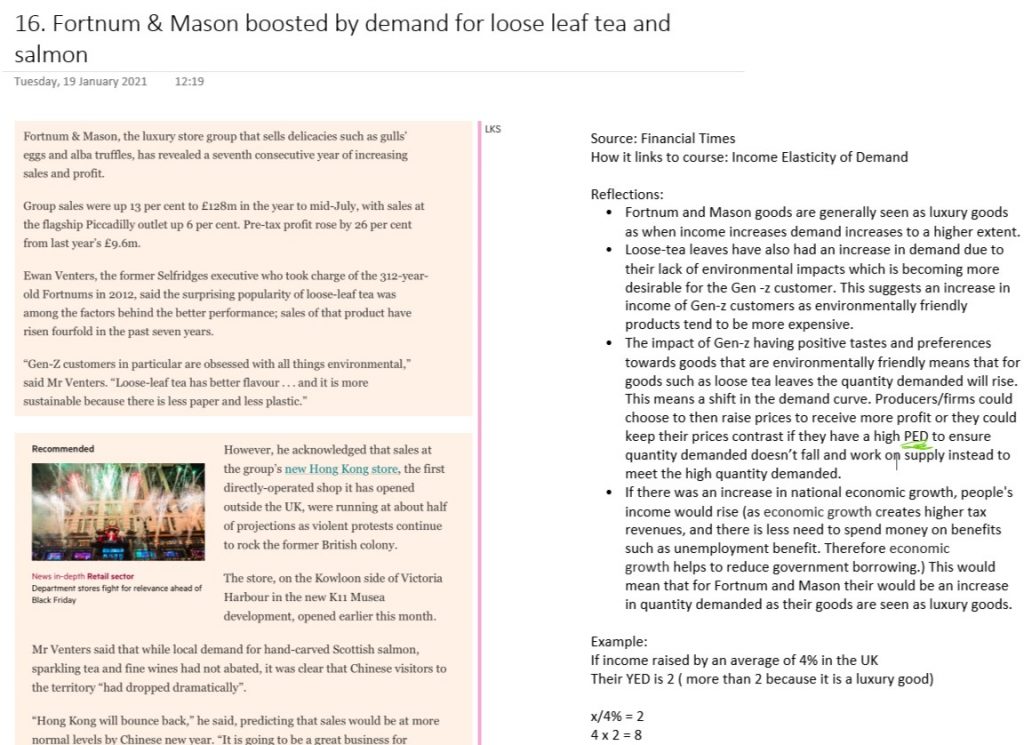This article focusses on how we incorporate current affairs into our teaching of A Level Economics. It is written by Richard Finch – Head of Economics at Wimbledon High School.
One great aspect of teaching Economics at A Level is that we can relate the topics on the specification to real world events. We run weekly news article review sessions with all our classes to build their understanding of contemporary issues in Economics and strengthen their ability to apply fundamental concepts and theories to these real-world events. For many pupils, beyond improving their chance of achieving a top grade and boosting their ability to critically analyse articles, this process builds their confidence to engage in debate and can be very empowering.
However, it often it is a challenge to stimulate that initial interest in current affairs, particularly stories related to the Economy. However, in recent years we have made significant progress on this issue.
At the start of the course, each week, we ask our Year 12 students to find two articles, one related to microeconomics (individual industries and business) and one to macroeconomics (the entire economy). These articles can be from any publication and on any subject that interests them.
The pupils post a brief summary of the article on our OneNote system along with their general reflections. We keep the brief very flexible at this stage and the emphasis is very much on exploring what interests them. We as teachers then review the articles and post some leading questions for each. This encourages the pupils to reflect on what they’ve read and think about where their research might lead them.

The pupils have time to prepare their response to these questions prior to the lesson. During the lesson the teacher will project the summary on the screen and the pupil then presents to the class. The teacher chooses three pupils from the class who have demonstrated clear analysis or whose topic area was addressed by many students in the class. We have found that celebrating work in this way creates an element of friendly competition and encourages others to engage.
Interestingly, although we do not limit the topics at this stage, the pupils tend to gravitate towards similar articles and as they source their information from different publications these presentations often lead to enthusiastic class debate. This also serves as a great way to break the ice with a new Year 12 class.
Through our questioning we encourage pupils to pursue additional articles on the same topic. Over weeks the pupils start to develop expertise in certain topic areas and having that deeper understanding builds their confidence. As they become more familiar with the jargon used in Economics they start to source articles from more challenging publications.
As the course progresses we start to encourage the pupils to apply the fundamental concepts and theories we cover in class to these real-world examples. We want our pupils to use this “Economics Toolkit” to deepen their analysis and understanding.
For example, here a pupil has applied their knowledge of Income Elasticity of Demand (the responsiveness of demand to a change in income) to the demand for Fortnum & Mason products to assess the extent to which these products can be described as luxury items and the implications of a change in national income on this particular organisation and the wider economy.

The term “luxury good” is used commonly in society but Economics pupils develop an understanding of what this term actually means and how it can be calibrated. This gives them a clearer understanding of the likely implications of a national rise in income on this market. They begin to make links at this stage between different concepts and ask broader questions, beyond the focus of that article. We continue to encourage them to explore and connect topic areas through our questioning and through class debate.
The pupils start to develop real expertise at this stage and we find ourselves referring to our “in-house retail expert” for example during class discussion. Being the authority on an issue is incredibly empowering for the pupils and builds their engagement and enthusiasm for the subject. The ultimate aim of this initiative is to encourage our pupils to use their voices and speak with authority on this traditionally male dominated subject.

